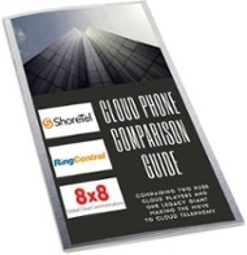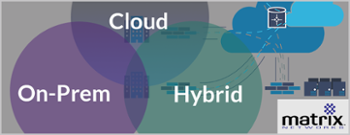
If you have explored replacing your communications solution in the last 2 years you have likely faced the question, Hosted vs Premise delivery? If you believe the industry hype, the only real option is moving your phone system to a cloud solution. There can be substantial value in moving to a cloud phone system, but to assume it is the right solution for every business is foolish. In this article we discuss why some organizations might choose one over the other, and using ShoreTel as an example, we will showcase one solution that has adapted well to the new market shift.
Why Cloud Phone Systems?
Enterprises are rapidly adopting cloud technologies, including voice. By subscribing to a service rather than purchasing hardware, the cost of communication become predictable and easy to control. This allows companies to scale flexibly without a large capital expenditure that depreciates quickly (the average on-prem phone system lasts 10 years or less.) Moving the equipment and support responsibilities to the service provider minimizes IT workload, freeing time for other projects and improving support to the end user by connecting directly with experts on the specific solution. The reliability of your communications platform is crucial; redundancies and disaster recovery strategies offered by top providers are robust and expensive to imitate with a hardware-based premise solution. Solutions offered directly from the manufacturers offer new feature sets like incorporation of SMS and advanced integrations to other cloud-based tools. This is a huge advantage to clients who are looking to communicate with others in more flexible, integrated way. Of course, none of us are immune to the "buzz" of cloud. In and of itself, this is not a good reason to choose cloud, unless you consider that most money is being spent on researching and development of new cloud platforms, allowing hardware solutions to fall behind.
For a look at 3 of the industries top Cloud Phone Vendors, download our Complimentary Cloud Phone Comparison Guide:
Cloud Phone Comparison Guide
Why Prem Phone System?
Although the excitement around cloud phone systems is real, there are still major advantages for many enterprises to use premise-based solutions. A common theme is total cost of ownership, something never achieved with cloud-based platforms. After reviewing the costs of hardware solutions against competing cloud solutions, most companies will discover the cost of a cloud solution is substantially more. Cutting edge tools like SMS may be missing from a premise solution, but the proven reliability of integrations to legacy and analog applications like door phones, overhead paging, and aging software is often just as, if not more, important as the latest innovation. Modern phone systems are relatively easy to manage, even when they are on premise. (shhhhh, don't tell anybody!) Using existing IT resources is often less expensive than paying outside entities to do the same. Although many cloud providers offer a global footprint, larger international players might have a hard time finding one that serves all locations. With premise-based solutions, this problem was solved ages ago with standardized equipment that operates on the local telecom network.
Great... Now What?
Investment in development for communications platforms has predictably increased for cloud-based products while nose diving for traditional premise-based products. This creates a challenge for companies that have a compelling case for maintaining an in-house system; the products are not advancing and support in the future is questionable. In the last 6 months, we have seen the fall of Toshiba Telecom, ShoreTel's sale and Avaya's bankruptcy. Unfortunately this is the tip of the decaying iceberg that is traditional telecom.
Most clients we work with are going to benefit from migrating to a cloud based phone system. The feature sets are more powerful, the platforms offer more reliability and the costs are trending downward. There are valid reasons however to seek a premise based solution. Engaging a trusted business partner with experience in communications, or a colleague who has recently made a change can be very helpful in the decision making process. We have compiled a list of important questions to answer to start the process.
5 Basic Questions to ask Yourself when Considering a New Business Phone System:
At Matrix, we understand the complexities associated with implementing a new business phone system. With that in mind, here are the 5 most basic questions to keep in mind when entering the conversation of replacing or purchasing a new phone system:
- Do you prefer to invest in technology as a capital or operational expense?
- What are the critical applications of my organization's phone system?
- What features would I like to see, and how would these new features help my business achieve its goals?
- Is my infrastructure in a position to support cloud? What would it take to get there?
- If disaster strikes, do I have a plan? Is there failover built into my network or will we simply go offline?
- Most importantly: what is the cost of a down phone system?
Looking at Building a Modern Network?
SD-WAN Must be a Part of the Conversation.
Click the Icon Below to read "3 Flavors of SD-WAN"
Author: Kyle Holmes



.svg%20(1).png?width=55&name=1200px-Logo_of_YouTube_(2015-2017).svg%20(1).png)

